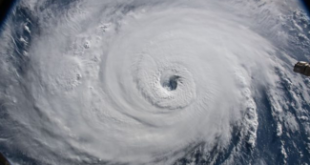By J.D. ALT It’s telling that in the media coverage about the damage inflicted by Hurricane Michael, there are a lot of stories about how the citizens of Mexico Beach would like to rebuild their town, but no stories at all about how they might be enabled to do that. Only the opposite: why it’s going to be virtually impossible for Mexico Beach to ever be Mexico Beach again. Why is that? One reason: These were modest structures in a modest town, paid for with modest, working-class incomes....
Read More »FUTURE DOLLARS
By J.D. ALT In recent essays I’ve made reference to a new framing of what is actually happening when the U.S. treasury issues a bond. It seems to me, this new framing goes to the heart of MMT and might well hold the key to a practical implementation of MMT principles in real world applications. The framing is this: A U.S. treasury bond is a certificate of issuance of future dollars. I will expand on this in a moment, but first it is important to say what this framing says a treasury bond...
Read More »CHANGE THE SUBJECT
By J.D. ALT So, I will now, once again, court blushing naivete…. In the middle of a contemplative walk—during which, I confess, I was imagining with enthusiasm how the Democrats might extract revenge should they win the House of Representatives in the mid-term elections (hearings and subpoenas relating to the FBI “investigation” of Brett Kavanaugh, subpoenas for Donald Trump’s tax returns, drawing up articles of impeachment, etc.)—I was suddenly struck by the realization of what a...
Read More »Paying for Hurricanes
By J.D. ALT What you believe America can build—or rebuild—as a collective society hinges on how you answer one fundamental question: When the U.S. government issues a treasury bond, is it “borrowing” money that must be repaid with future tax-dollars—or is it “creating” money that can be spent to accomplish big and important collective goals? Getting the right answer to this question could be existentially important. As I’m writing, for example, Hurricane Florence is unleashing...
Read More »Miscalculating Medicare-for-all
By J.D. ALT A report from the Mercatus Center at George Mason University calculating the “cost” of Medicare-for-all has received much attention recently—first, because Bernie Sanders claimed the report concluded that Medicare-for-all would save the American people $2 trillion over a 10-year period. That claim was still warm when the report’s author, Charles Blahous, told the Washington Post that Bernie’s interpretation of the report’s conclusions were blatantly false. In fact, Blahous...
Read More »How big does the fire need to be?
By J.D. ALT I have written about this before, but it bears repeating now—and perhaps it bears repeating every week until somebody with more leverage than me picks the message up and carries it a step further: America (and the rest of the world, for that matter) has the resources needed to limit and mitigate the enormous damage and dislocations that climate-change is now beginning to impose. The “resources” I’m referring to are not dollars. They are materiel, labor, and human ingenuity....
Read More »The Explicable Mystery of the National Debt
By J.D. ALT America’s current “national debt” is tallied to be $21.5 trillion. When politicians and economic pundits talk (worry, fret, wring their hands, gnash their teeth) about this “debt” they implicitly assume—along with their listeners, readers, and potential voters—that this fantastic sum will eventually have to be paid back. That’s what happens with debts, right? Someone calls them due! Everyone also assumes the American tax-payer will have to do the paying. (Quick calculation...
Read More »The Five Stages of Money (and why we’re stuck at stage 4)
By J.D. ALT Like everything else, money has evolved. It began in a primitive form and morphed into something more sophisticated, more successful. Then, probing and testing for an even better form, it morphed again. A simplified history of money’s evolution can be outlined in five stages: STAGE 1: Money is a tangible thing of value—e.g. a gold coin. At some point in the pre-history of humankind, the “invention” of money solved a time-gap problem in cooperative trade: I’ll give you my...
Read More »Last Exit to the Road Less Traveled
By J.D. ALT We now stand where two roads diverge. But unlike the roads in Robert Frost’s familiar poem, they are not equally fair. The road we have long been traveling is deceptively easy, a smooth superhighway on which we progress with great speed, but at its end lies disaster. The other fork of the road—the one less traveled by—offers our last, our only chance to reach a destination that assures the preservation of the earth. Rachael Carson, Silent Spring What’s important to keep in...
Read More »Why America is not a Country-Club
By J.D. ALT Everyone knows how a country-club works: Members pay dues, and the dues are used to pay for the expenses of running the country-club—maintenance and improvements, kitchen and service staff, golf-course mowing and landscaping, etc. Sometimes a big expense comes along (like putting a new roof on the main club-house) and the cash-flow from the monthly, or annual, dues isn’t enough to cover the one-time cost. In that case, the club would take out a bank-loan to pay for the new...
Read More » Heterodox
Heterodox






